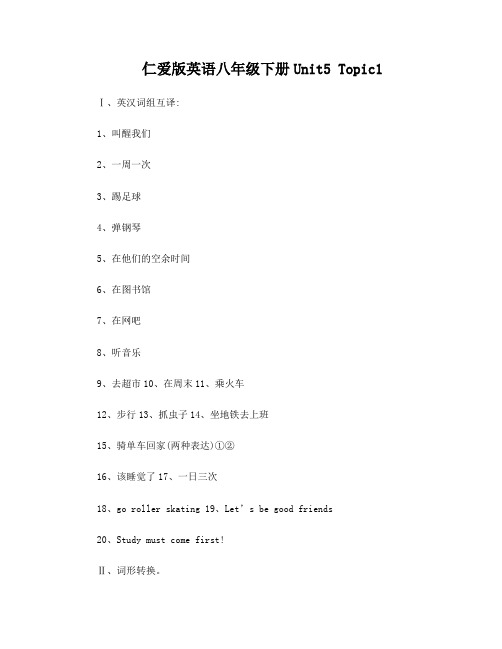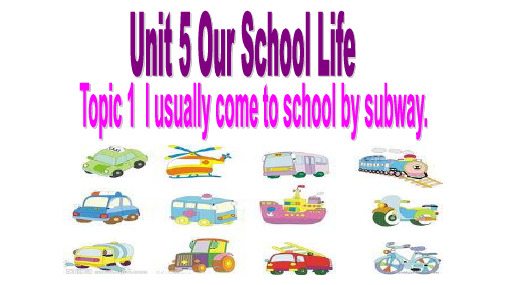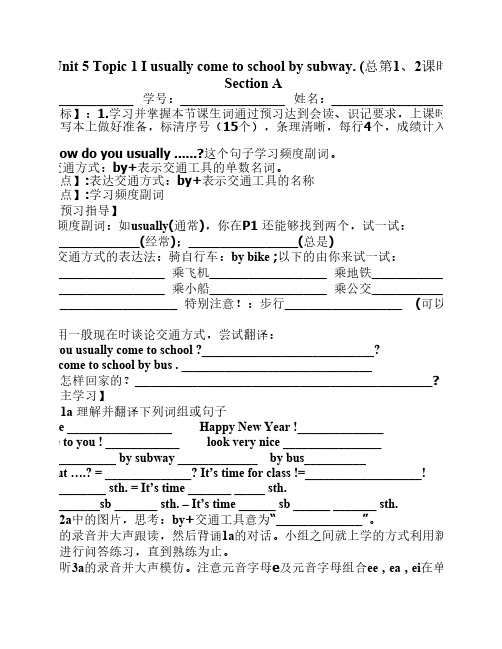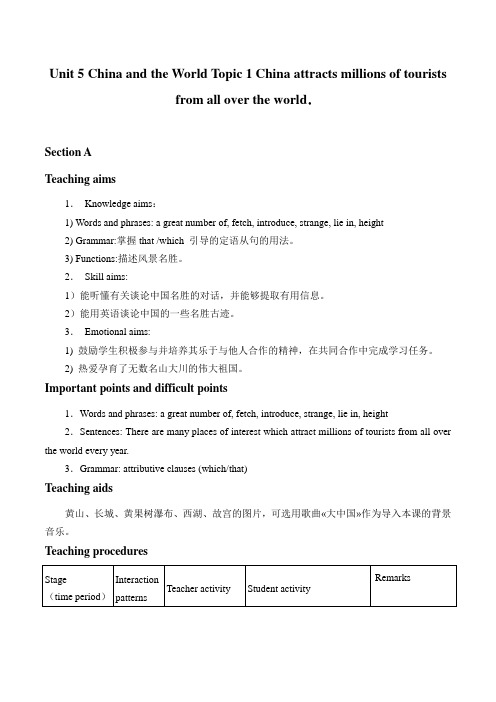Unit 5 Topic 1 第三课时
七年级英语(仁爱版)下册 Unit-5-Topic-1 知识点总结语言点归纳

知识点七年级英语(仁爱版)下册Unit-5-Topic-1语言点归纳Unit 5 Topic 1I 重点词汇和短语gate, by, always, plane, train, ship, boat, Ms., grandmother, group, weekday, early, bird, catch, seldom, walk, never, sometimes, ride, park, watch, TV, homework, life, American, or, few, day, rest, play, basketball, swim, ball, game, read, listen, library, once, twice, week, every, must, first, music, begin, while, wall, bed.the same to, come on, on foot, by plane, know about, for a while, watch TV, do (one’s) homework, have lunch, at school, have a rest, be different from, go swimming, listen to, go to bed, go to school, have classes.II 语言点Section A1. a) ---Happy New Year! ---- The same to you! / You, too. 新年快乐!也祝你新年快乐!b) ----Happy birthday! -----Thank you! 生日快乐!谢谢!2. How about you? = What about you? 你怎么样?3. Oh, your new bike looks very nice! 哦,你的新自行车看起来很好看。
仁爱版英语八年级下册Unit5_Topic1基础练习题

仁爱版英语八年级下册Unit5 Topic1 Ⅰ、英汉词组互译:1、叫醒我们2、一周一次3、踢足球4、弹钢琴5、在他们的空余时间6、在图书馆7、在网吧8、听音乐9、去超市10、在周末11、乘火车12、步行13、抓虫子14、坐地铁去上班15、骑单车回家(两种表达)①②16、该睡觉了17、一日三次18、go roller skating 19、Let’s be good friends20、Study must come first!Ⅱ、词形转换。
1、first(基数词)2、day(对应词)3、by sea(同义词组)4、by air(同义词组)5、late(反义词)___________6、life(复数)__________7、finish(第三人称单数)______ 8、spare(同义词)________9、story(复数)________ 10、piano(复数)_________11、finish(第三人称单数)______ 12、catch(第三人称单数)_______ 13、see(同音词)________ 14、bye(同音词)________15、around(同义词)______ 16、swim(现在分词)________17、come(现在分词)______ 18、new(反义词)__________19、feet(单数)___________ 20、often(同义词)_________Ⅲ、用所给词的适当形式填空。
1、It’s time ____ to bed. (go)2、They want _____ with you. (be)3、Ann _____ from America. (come)4、Tom _____ TV for a little while every day. (watch)5、Does your sister _____ homework in the evening? (do)6、I go to see the movie two _____ a month. (time)7、Today is the _____ day of the week. (one)8、Kate _____ to come here early. (have)9、We often go to the park by _____. (bus)10、Thank you for _____ help. (you)11、I usually go _____ in my spare time. (shop)12、My friends often _____ ball games after class. (play)13、Rose _____ in our school. (study)14、Mr. Green _____ them English. (teach)15、Kate _____ her homework carefully. (do)16、He often goes _____ on weekends. (dance)17、Maria _____to school every day. (ride)18、Please pass the book to ______. (he)19、We usually go school on _____. (foot).20、Miss Wu teaches ______ English. (we)Ⅳ、完成并翻译句子。
2021学年仁爱版英语七年级下册Unit 5 topic 1 ---3期末 复习课件,

19.打篮球
visit the Great Wall
踢足球 play basketball
20.开车去公园pl野ay餐sodcrciever/afocaortbtaollthe park for a picnic
21.快点;加油;来吧 = go to the park for a picnic by car 22.在平日,在工作日 come on
1. I want to have
and
(一些米饭和鸡肉).
2. I’d like
(两杯水).
3. Please give me some(三ri个ce鸡蛋). chicken
4. I have (许多)vegetables and (许多)fish for supper.
two glasses of water
=I never take the subway/underground to school.
5.你多久来一次图书馆?
How often do you come to the library? 很经常。/一周三次。/很经常/每天。
Three times a week./ Very often ./ Every day. 6.我很少步行上学。
come/go to sp. by subway/underground 31.乘=t公ak共e 汽th车e 来su/b去w某ay处/underground to sp.
come/go to sp.by bus=take a bus to sp. 32.乘火车来/去某处
come/go to sp. by train=take a train to sp.
14.多经常,多久……一次
15.放学后 晚饭后
七年级英语仁爱版下册_Unit5_Topic1_课时同步练(解析版)

2020-2021学年度仁爱版七年级英语下册Unit 5 Topic1 I usually come to school by subway.达标测试卷学校:___________姓名:___________班级:___________考号:___________(满分:100分;考试时间:80分钟)第I卷(选择题)一、单选题(每小题1分,共10分)1.On Sundays I often go to a ________ to see old things.A.library B.museum C.theatre D.farm【答案】B【详解】句意:周日我经常去博物馆去看一些旧东西。
考查名词辨析。
library图书馆;museum博物馆;theatre剧院;farm农场,根据后面的“to see old things”可知,应该是去博物馆去看一些旧东西,故选B。
2.—Let's play soccer after class, David.― ________ great.A.Sounds B.Sees C.Looks D.Listens【答案】A【详解】句意:——大卫,让我们课后踢足球吧。
——听起来不错。
考查动词辨析。
Sounds听起来;Sees看见;Looks看;Listens听,后面接介词to,根据前面的“Let's play soccer after class, David”和后面的“great”形容词,所以空格处用系动词,表示同意对方的建议。
故选A。
3.—Where are you from?—We are from ________. We are ________.A.English; England B.Chinese; China C.American; America D.England; English【答案】D【详解】句意:——你们来自哪里?——我们来自英国。
仁爱版八年级下册英语unit5-topic1-教案

Unit 5二、教材分析本单元的三个话题紧紧围绕情感这个主题展开。
第一部分通过Kangkang, Maria, Jane和 Michael四个同学谈论《音乐之声》以及与 Mr.Lee的谈话自然地引出了高兴和快乐、失望和遗憾的情感。
第二部分由Beth的哭泣引出伤心的情感,进而由老师的出现引出安慰及建议等用语。
第三部分围绕Michael的病情巩固各种情感,并引出事物对情感的影响。
本单元主要以活动的形式,联系生活实际,把英语教学和情感教育有机地结合起来。
Topic 1这个话题通过Mr.Lee和同学们对话,呈现了孩子们的高兴和李老师因没有票而感到失望和遗憾,进而引出各种情感,集中体现了有关情感的形容词及一些短语。
在这个话题中,你将学会如何表达自己的情感,如何描述自己或他人的情感,还可以了解一些戏剧和电影等方面的相关知识。
主要句型有:You look/feel/sound...They are very lucky.Did Michael’s mother sound worried?How does Mr. Lee feel?He feels disappointed.Why is he disappointed?Because he can’t get the ticket to The Sound of Music.三、教学建议Topic 1Section ASection A需用1~2课时。
重点活动是1,2和3。
教学目标:1.能听懂谈论个人情感的比较熟悉的话题,获取主要信息。
2.掌握be+adj. 的用法。
教学过程:第一步:复习师生问候。
谈谈寒假生活及过春节的感受。
如:Teacher: How are you? / How are you doing?Student1: Fine,thanks!Teacher: You look so happy, why?Student1: I come back to school again, so I’m glad to see my classmates.Teacher: Did you have a good winter holiday?Student2:Yes,I did.Teacher: How about your Spring Festival?Student2:I had a wonderful Spring Festival. I got...Teacher: Why all the smiling faces?Students: Because today is the first day of this term...第二步:呈现1.在师生对话之后,老师板书呈现课题。
Unit 5 Topic 1 How do you usually come to school

Unit 5 Topic 1 I usually come to school by subway. (总第1、2课时)Section A______________ 学号:_________________ 姓名:_____________________【学习目标】:1.学习并掌握本节课生词通过预习达到会读、识记要求,上课时默写,要求在听写本上做好准备,标清序号(15个),条理清晰,每行4个,成绩计入个人周成2. 利用How do you usually ......?这个句子学习频度副词。
3. 表达交通方式:by+表示交通工具的单数名词。
【学习重点】:表达交通方式:by+表示交通工具的名称【学习难点】:学习频度副词【知识点预习指导】A:学习频度副词:如usually(通常),你在P1 还能够找到两个,试一试:____________(经常);______________(总是)B:学习交通方式的表达法:骑自行车:by bike ;以下的由你来试一试:乘火车_______________ 乘飞机_______________ 乘地铁_______________乘轮船_______________ 乘小船_______________ 乘公交_______________乘小轿车_______________ 特别注意!:步行_______________ (可以参考课本C:能够用一般现在时谈论交通方式,尝试翻译:How do you usually come to school ?____________________________?I usually come to school by bus . _______________________________康康总是怎样回家的?______________________________________?自主学习】Read 1a理解并翻译下列词组或句子at the gate _________________ Happy New Year !______________The same to you ! ____________ look very nice ________________by bike___________ by subway _____________ by bus__________How about ….? = ______________? It’s time for class !=___________________!It’s time ________ sth. = It’s time _______ _____ sth.It’s time _______sb _______ sth. – It’s time ______ sb ______ _______ sth.观察2a中的图片,思考:by+交通工具意为“___________”。
仁爱版英语九年级下册:Unit 5 Topic 1. China attracts millions

Unit 5 China and the World Topic 1 China attracts millions of touristsfrom all over the world.Section ATeaching aims1.Knowledge aims:1) Words and phrases: a great number of, fetch, introduce, strange, lie in, height2) Grammar:掌握that /which 引导的定语从句的用法。
3) Functions:描述风景名胜。
2.Skill aims:1)能听懂有关谈论中国名胜的对话,并能够提取有用信息。
2)能用英语谈论中国的一些名胜古迹。
3.Emotional aims:1) 鼓励学生积极参与并培养其乐于与他人合作的精神,在共同合作中完成学习任务。
2) 热爱孕育了无数名山大川的伟大祖国。
Important points and difficult points1.Words and phrases: a great number of, fetch, introduce, strange, lie in, height2.Sentences: There are many places of interest which attract millions of tourists from all over the world every year.3.Grammar: attributive clauses (which/that)Teaching aids黄山、长城、黄果树瀑布、西湖、故宫的图片,可选用歌曲«大中国»作为导入本课的背景音乐。
Teaching proceduresBlackboard designSection BTeaching aims1.Knowledge aims:1) Words and phrases: stone, guard, It’s said that…, a symbol of, play an important part in …2) Grammar:进一步掌握that /which 引导的定语从句的用法。
仁爱英语九年级Unit5_Topic1练习题及答案解析

Unit 5 Topic 1(考试时间:90分钟,满分:100分)第一部分听力(20分)Ⅰ.听句子,选择正确图片。
每个句子读一遍。
(5分)1. ______2. ______3. ______4. ______5. ______Ⅱ.听句子,选择正确答语。
每个句子读一遍。
(5分)( )6.A.Mount Ali. B.West Lake. C.Mazu Temple.( )7.A.Yes, I am. B.No, I don’t. C.Only a little.( )8.A.Yes, it is. B.No, it isn’t. C.Yes, it lies in Anhui.( )9.A.Mount Sun Moon. B.Sun Moon Lake. C.Sun Moon River.( )10.A.No, I haven’t. B.Yes, I do. C.Yes, I am.Ⅲ.听对话及问题,选择正确答案。
每段对话及问题读一遍。
(5分)( )11.A.Over 5,000 years. B.About 5,000 years. C.Less than 4,000 years.( )12.A.In the library. B.At home. C.In the office.( )13.A.The Foggy City. B.The Mount City. C.The Foggy City and the Mount City. ( )14.A.Yes, he does. B.No, he doesn’t. C.We don’t know.( )15.A.People don’t love the beautiful scenery. B.It’s worth seeing.C.You’re welcome to go there.Ⅳ.听短文,判断正(T)误(F)。
短文读两遍。
(5分)( )16.I went to Haikou to spend my summer holiday last year.( )17.There are a lot of ships in Haikou.( )18.It’s warm and rains a lot in Haikou.( )19.The number of Haikou’s population is about 1,000,000.( )20.I would like to go there again this year.第二部分基础知识运用(55分)Ⅰ.单项选择。
- 1、下载文档前请自行甄别文档内容的完整性,平台不提供额外的编辑、内容补充、找答案等附加服务。
- 2、"仅部分预览"的文档,不可在线预览部分如存在完整性等问题,可反馈申请退款(可完整预览的文档不适用该条件!)。
- 3、如文档侵犯您的权益,请联系客服反馈,我们会尽快为您处理(人工客服工作时间:9:00-18:30)。
P4 2b. Ask and answer questions about the pictures in 2a with your partner.
• Example:
• A: How does Li Xiang go to school? • B: He often goes to school by bike./ He
early worm seldom walk bird sometimes never
weekday catch
bird
wormΒιβλιοθήκη play soccer/football /’sɔkə/ /ɔ:/
walk
see a movie /’mu:vi/
watch /wɔtʃ/ TV
do one’s homework
= He usually _g_o_e_s_ to Beijing _b_y_ _p_la_n_e_.
She often rides a bike to work. = She often _g_o_e_s__ to work _b_y___bi_k_e___. They always take a car to school. = They always _g_o__ to school _b_y__ca_r____
movie 2.词组:watch TV 3.句型:
(1)Li Xiang often rides a bike to school.
(2)Maria sometimes takes the subway home.
1.完成2a(抄写)。 2.完成2b(写四个对话)。 3.熟读P6 4a/4b。 4.完成练习册相关练习。
P4 3 录音
Activity Frequency
walk to school
take a bus do her homework to school in the evening
always
√
usually
often
√
sometimes
√
seldom
never
P4 3. Listen to the passage about Nancy’s activities and check (√) the correct answers.
often rides a bike to school.
play soccer/football
walk
see a movie
watch TV
do one’s homework
P4 3. Listen to the passage about Nancy’s activities
and check (√) the correct answers.
go…by subway — take the subway go…by bike — ride a bike go…on foot — walk go…by bus — take a bus go…by car — take a car go…by plane — fly
E.g. He usually flies to Beijing.
P3 2a. Study the example to understand the two
ways of expressing the same meaning. Then fill in the blanks.
Example: Li Xiang often comes to school by bike. Li Xiang often rides a bike to school.
/ai/
P3 2a. Study the example to understand the two
ways of expressing the same meaning. Then fill in the blanks.
1
Maria sometimes _g_o_e_s_ home _b_y__s_u_b_w_a_y__. Maria sometimes takes the subway home.
with the pictures.
P4 4 视频
by bike by plane by train
on foot
P6 4a. Read and write the words.
read feet head great bridge
P6 4b. Read the following sentences aloud, paying attention to the rising tone( ) and the falling tone ( ).
Activity watch TV in the
Frequency afternoon
always
usually
often
sometimes
seldom
never
√
play soccer on Sundays
√
see a movie
√
4. Chant and then match the first four sentences
P3 2a. Study the example to understand the two
ways of expressing the same meaning. Then fill in the blanks.
2
We usually go to the park on foot. /pɑ :k/
We usually __w_a_l_k_ to the park.
P3 2a. Study the example to understand the two
ways of expressing the same meaning. Then fill in the blanks.
3
They always go to the zoo by bus. They always __ta_k_e_ __a___ _b_u_s__to the zoo.
• 1. The Chinese judge needs cheese, meat and bread.
• 2. The girl in jeans can cook great beef.
P6 4b 录音
1.单词:ride, park, watch, TV, television, soccer,
